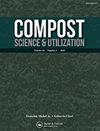Rice Bran Addition to Leaf Compost Can Reduce Radiocesium Concentration and Its Uptake by Crops After the Fukushima Daiichi Nuclear Power Plant Accident
IF 0.9
4区 农林科学
Q3 ECOLOGY
引用次数: 0
Abstract
Abstract Leaf composting is an essential technique in organic farming; it improves the physicochemical properties of soil such as texture, structure, water-holding capacity, and nutrient content. However, the use of leaf compost is prohibited in the Fukushima and Ibaraki prefectures because large areas of the Fukushima and Ibaraki forests were contaminated by radiocesium (134Cs and 137Cs) after the Fukushima Daiichi nuclear power plant (FDNPP) accident. We examined the changes in radio Cs concentration and other physicochemical properties in leaf compost made from Ibaraki and Fukushima forest leaves. At the beginning of the composting process, rice bran-treated compost showed 25%–32% lower radio Cs concentration than the leaf-only compost; however, 2 years after composting, the difference in concentration between these treatments had increased to 35%–63%. Moreover, the incorporation of rice bran significantly increased the compost temperature, moisture, electrical conductivity, bulk density, and total nitrogen during the composting process. Plant uptake of radio Cs was significantly lower in rice bran-treated compost than the leaf-only compost at each level of application; furthermore, the levels of soil radio Cs showed a similar trend. Potassium application combined with leaf compost resulted in a significant reduction of radio Cs plant uptake. Our data revealed that adding rice bran to leaves positively affects radio Cs reduction in leaf compost and also reduces its uptake by plants. Our findings may improve the management of leaf composting after the FDNPP accident.福岛第一核电站事故后,水稻秸秆堆肥中添加米糠可降低作物对放射性元素的吸收
摘要叶片堆肥是有机农业的一项重要技术;它改善了土壤的理化性质,如质地、结构、持水能力和养分含量。然而,福岛县和茨城县禁止使用树叶堆肥,因为福岛第一核电站(FDNPP)事故后,福岛和茨城的大片森林被放射性铯(134Cs和137Cs)污染。我们研究了茨城和福岛森林树叶制成的树叶堆肥中放射性Cs浓度和其他物理化学性质的变化。在堆肥过程开始时,米糠处理的堆肥的放射性Cs浓度比纯叶堆肥低25%-32%;然而,2 堆肥几年后,这些处理之间的浓度差异增加到35%-63%。此外,在堆肥过程中,米糠的加入显著提高了堆肥温度、湿度、电导率、堆密度和总氮。在各个施用水平上,米糠处理的堆肥中的植物对放射性Cs的吸收显著低于纯叶堆肥;此外,土壤放射性Cs水平也呈现出类似的趋势。施用钾与叶堆肥相结合可显著降低植物对放射性Cs的吸收。我们的数据显示,在叶子中添加米糠会积极影响叶子堆肥中放射性Cs的减少,也会减少植物对其的吸收。我们的研究结果可能会改善FDNPP事故后树叶堆肥的管理。
本文章由计算机程序翻译,如有差异,请以英文原文为准。
求助全文
约1分钟内获得全文
求助全文
来源期刊

Compost Science & Utilization
农林科学-生态学
CiteScore
4.10
自引率
0.00%
发文量
0
审稿时长
>36 weeks
期刊介绍:
4 issues per year
Compost Science & Utilization is currently abstracted/indexed in: CABI Agriculture & Environment Abstracts, CSA Biotechnology and Environmental Engineering Abstracts, EBSCOhost Abstracts, Elsevier Compendex and GEOBASE Abstracts, PubMed, ProQuest Science Abstracts, and Thomson Reuters Biological Abstracts and Science Citation Index
 求助内容:
求助内容: 应助结果提醒方式:
应助结果提醒方式:


